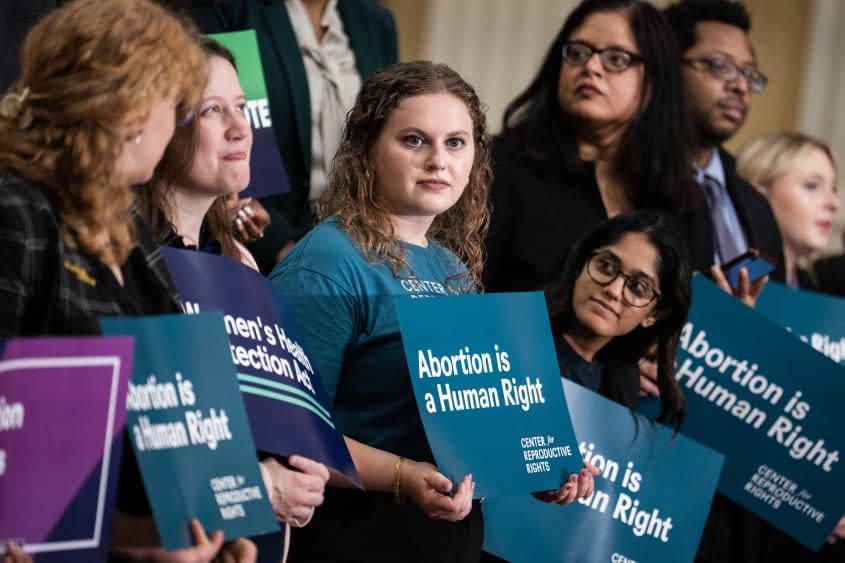Did the Dobbs decision help or hinder Republicans?

It has been one year since the Supreme Court overturned Roe v. Wade in the Dobbs v. Jackson Women's Health Organization decision, denying people's right to an abortion and returning the power to the states. While viewed as a monumental win for Republicans, a FiveThirtyEight analysis found that more Americans think abortion should be legal in most cases since the Dobbs decision. "Some increase in support for legalization was evident prior to Dobbs … particularly among Democrats," said Lydia Saad, the director of U.S. Social Research for Gallup, to FiveThirtyEight. "But increased support has since accelerated."
Republican lawmakers made the anti-abortion ideology a priority issue in their campaigns, talking about overturning Roe and imposing bans. South Carolina Sen.Tim Scott (R), who is also running for president in 2024, emphasized in a piece for the Des Moines Register that if elected president, he would "sign the most pro-life legislation the House and Senate can put on [his] desk." Many states have already passed total abortion bans or very restrictive abortion laws, but almost all of those that put the law up to vote in the state have failed to pass it, including Nebraska and South Carolina.
This shift in support for abortion has once again brought up debates as to how influential of an issue abortion will be in the coming election and whether the GOP victory over abortion will backfire.
Intent vs. outcome
While Republicans rejoiced over the Dobbs decision as a win for life, the decision has done more harm than good. "We have seen the devastating physical, mental and economic impact the decision has had on women and their families across the country," remarked Congresswoman Annie Kuster (D-N.H.) in an opinion for Newsweek. Maternal health care has been declining nationwide, especially in states where strict abortion bans were passed. This puts the lives of many, including children, at risk.
Contrary to what was expected, abortion rates dropped the most during the Barack Obama administration despite former President Donald Trump vocally advocating for pro-life policies, wrote David French, a columnist for The New York Times. The Supreme Court's "legal triumph also sowed the seeds of its cultural defeat," and "the culture in which we live decisively influences whether men and women possess the hope sufficient to have a child."
In addition, the decrease in abortions due to Dobbs was less than predicted. This is largely because of the divide in the legality of abortion across the country. "Abortion bans and restrictions disproportionately harm marginalized communities," noted Samuel Dickman for CNN. Many don't have immediate access to necessary health care, creating deserts, especially in rural areas in anti-abortion states. "Survivors of sexual assault are retraumatized as they try to overcome obstacles to get abortion care or are forced to remain pregnant."
While intended to save lives, removing abortion protections caused a ripple of negative impacts that could potentially result in more deaths. "Valuing fetal life over the lives of women and girls was no doubt a feature, not a bug, in the majority's view; that was, after all, the point of Dobbs," wrote Linda Greenhouse in a Times opinion piece. However, with all the consequences, Americans will "take their sorrow or their fury or their despair to the polls."
People vs. government
"The legislators are insulated from electoral consequences for their failure to represent the whole public," wrote Francis Wilkinson in a Bloomberg opinion piece. "One year after the momentous overturning of Roe, returning the issue of abortion to the people's representatives has proved to be just another joke on democracy." Many Republican-led states have party lines drawn to keep the GOP in power and, in turn, "committed to imposing minority rule."
In reality, "Dobbs never really embraced democracy in the first place," remarked Mary Ziegler and Reva Siegel in an opinion piece for the Los Angeles Times, "especially not a robust, modern concept of democracy that guarantees equality and key liberties." The anti-abortion laws being passed in the states are unpopular and go against the majority of the public's opinion. According to Gallup, abortion is still a pressing issue for most voters, with over 50% saying that it's a factor they take into consideration when evaluating candidates.
But "it's not so easy for Republicans to drop a stance" like abortion even though anti-abortion views are mostly unpopular, according to Jennifer Rubin in The Washington Post. Those who identify as pro-life "have made clear they will not support candidates who shrink from the post-radical anti-abortion stance." Essentially, the GOP is stuck in a cycle of appealing to their supporters much to the chagrin of everyone else. Republicans have "locked themselves into a stance that simultaneously generates extreme opposition while producing nonstop stories demonstrating the cruel and dangerous results of their policies."
The abortion debate places the people at odds with the government, and there's "little sign that the opponents of reproductive rights will accept the results of popular politics," Ziegler and Siegal continued. The restrictiveness of many states' laws has widened support for abortion. It might just be the issue to turn things against the GOP, and "Republicans will have only themselves to blame," concluded Rubin.
You may also like
Problematic Ford Explorer recall prompts federal investigation
Did the Dobbs decision help or hinder Republicans?
Putin's grip on power apparently damaged after Wagner mutiny

